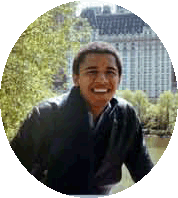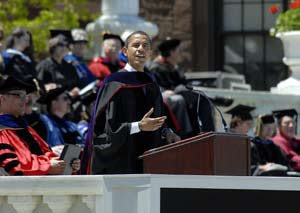In this excerpt from one of his speeches, Barack Obama talks about a time in his life when he “began to notice a world beyond myself ” and about his desire to be an agent of change. These remarks were made in a commencement address at Wesleyan University, Middletown, Connecticut, May 25, 2008. I became active in the movement to oppose the apartheid regime of South Africa. I began following the debates in this country about poverty and health care. So that by the time I graduated from college, I was possessed with a crazy idea — that I would work at a grassroots level to bring about change. I wrote letters to every organization in the country I could think of. And one day, a small group of churches on the South Side of Chicago offered me a job to come work as a community organizer in neighborhoods that had been devastated by steel plant closings.
My mother and grandparents wanted me to go to law school. My friends were applying to jobs on Wall Street. Meanwhile, this organization offered me $12,000 a year plus $2,000 for an old, beat-up car. And I said yes. Now, I didn’t know a soul in Chicago, and I wasn’t sure what this community organizing business was all about.
I had always been in-spired by stories of the Civil Rights Movement and JFK’s [President John F. Kennedy’s] call to service, but when I got to the South Side, there were no marches, and no soaring speeches. In the shadow of an empty steel plant, there were just a lot of folks who were struggling. And we didn’t get very far at first. I still remember one of the very first meetings we put together to discuss gang violence with a group of community leaders. We waited and waited for people to show up, and finally, a group of older people walked into the hall.
And they sat down. And a little old lady raised her hand and asked, “Is this where the bingo game is?” It wasn’t easy, but eventually, we made progress. Day by day, block by block, we brought the community together, and registered new voters, and set up after-school programs, and fought for new jobs, and helped people live lives with some measure of dignity.
But I also began to realize that I wasn’t just helping other people. Through service, I found a community that embraced me; citizenship that was meaningful; the direction I’d been seeking. Through service, I discovered how my own improbable story fit into the larger story of America.





 In this excerpt from one of his speeches, Barack
In this excerpt from one of his speeches, Barack Nine-year-old Barack in Indonesia with his mother; stepather Lolo Soetoro; and half sister Maya.
Nine-year-old Barack in Indonesia with his mother; stepather Lolo Soetoro; and half sister Maya. Barack Obama, center, on his school’s junior varsity basketball team in Hawaii, 1977
Barack Obama, center, on his school’s junior varsity basketball team in Hawaii, 1977 tes is consistently ranked as one of the world's top exporters of mercury, a substance that, when ingested, can lead to learning disabilities and physical ailments. This law will remove a significant amount of mercury from the global market and lessen the threat this substance poses to the world's most vulnerable citizens. Obama and Murkowski introduced this bill in the Senate and Representative Allen introduced companion legislation in the House of Representatives. This bill is also cosponsored by Senators Joseph Biden (D-DE), Carl Levin (D-MI), and Ken Salazar (D-CO).
tes is consistently ranked as one of the world's top exporters of mercury, a substance that, when ingested, can lead to learning disabilities and physical ailments. This law will remove a significant amount of mercury from the global market and lessen the threat this substance poses to the world's most vulnerable citizens. Obama and Murkowski introduced this bill in the Senate and Representative Allen introduced companion legislation in the House of Representatives. This bill is also cosponsored by Senators Joseph Biden (D-DE), Carl Levin (D-MI), and Ken Salazar (D-CO).